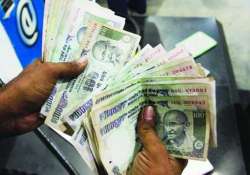Indian rupee to slip further against dollar: CII survey
New Delhi, July 7: The rupee will continue to remain volatile and may weaken further against dollar if the government doesn't address issues like dwindling FDIs and infrastructural bottlenecks, a survey said today. "We need

New Delhi, July 7: The rupee will continue to remain volatile and may weaken further against dollar if the government doesn't address issues like dwindling FDIs and infrastructural bottlenecks, a survey said today. "We need to move fast on the next round of reforms by addressing constraints such as land acquisition and environment which delay investments in industry and infrastructure. Also, We have to encourage FDI by easing of investment caps and continue rollback of fuel and fertiliser subsidies, the CII said in a statement.
It also asked to take steps to improve investment environment and make India an attractive business destination for both domestic and foreign investors to prevent excessive volatility and downward pressure on the rupee. "The rupee would continue to remain volatile and might weaken further against the dollar during the next quarter if downside risks accruing from high CAD and dwindling of FDI flows remain unaddressed," it said.
A majority of participants are expecting the rupee to trade above 59 against the dollar till September. However, some respondents expect it to remain in the vicinity of 58-59 to a dollar. "The large current account deficit (CAD) and our growing vulnerabilities on the external front have largely contributed towards the secular decline and the current volatility of the rupee," it added. The majority of the respondents have cited high CAD and burgeoning gold imports as the major reason for the recent downslide of the rupee. "Other reasons such as weak domestic sentiments and rising demand for dollars by importers also matter but their significance is much less," it said.
It said the weak rupee contribute towards imported inflation and this may discourage the RBI to cut policy rates in the next monetary policy review. "Another significant impact would be the rise in under-recoveries of the oil marketing companies which in turn would raise the subsidy bill of the government and consequently push up the fiscal deficit, going forward," CII said.
Further, it said the RBI should not intervene in the foreign exchange market to arrest the rupee fall. It said that there is a need to continue with the reform agenda to arrest the rupee decline. Among the reform measures to be undertaken, it asked to fast track 50 mega projects exceeding Rs 1,000 crore in the next 6 months and 200 large projects between Rs 250 crore and Rs 1,000 crore in another 6 months. Besides, it asked to further ease the restrictions on FII/ECB flows, removal of short-term capital gain tax on FIIs.
It also asked to take steps to improve investment environment and make India an attractive business destination for both domestic and foreign investors to prevent excessive volatility and downward pressure on the rupee. "The rupee would continue to remain volatile and might weaken further against the dollar during the next quarter if downside risks accruing from high CAD and dwindling of FDI flows remain unaddressed," it said.
A majority of participants are expecting the rupee to trade above 59 against the dollar till September. However, some respondents expect it to remain in the vicinity of 58-59 to a dollar. "The large current account deficit (CAD) and our growing vulnerabilities on the external front have largely contributed towards the secular decline and the current volatility of the rupee," it added. The majority of the respondents have cited high CAD and burgeoning gold imports as the major reason for the recent downslide of the rupee. "Other reasons such as weak domestic sentiments and rising demand for dollars by importers also matter but their significance is much less," it said.
It said the weak rupee contribute towards imported inflation and this may discourage the RBI to cut policy rates in the next monetary policy review. "Another significant impact would be the rise in under-recoveries of the oil marketing companies which in turn would raise the subsidy bill of the government and consequently push up the fiscal deficit, going forward," CII said.
Further, it said the RBI should not intervene in the foreign exchange market to arrest the rupee fall. It said that there is a need to continue with the reform agenda to arrest the rupee decline. Among the reform measures to be undertaken, it asked to fast track 50 mega projects exceeding Rs 1,000 crore in the next 6 months and 200 large projects between Rs 250 crore and Rs 1,000 crore in another 6 months. Besides, it asked to further ease the restrictions on FII/ECB flows, removal of short-term capital gain tax on FIIs.